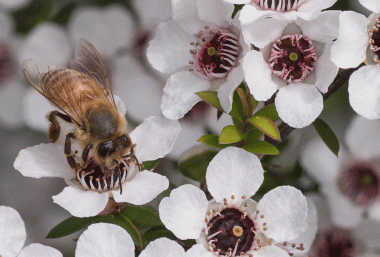The global honey market is estimated to be worth over US$8 billion dollars, and Mānuka honey is the industry’s “Queen Bee”. Mānuka is the Māori name for leptospermum scoparium, a species of flowering plant indigenous to New Zealand. Nectar from Mānuka produces a honey boasting unique medicinal and antibacterial qualities.
New Zealand’s own regulatory framework ensures Mānuka honey remains a premium product and high-value export. However, increasing international demand for Mānuka products have created challenges for the Mānuka industry, and more specifically those in the industry who are working towards protecting Mānuka as a taonga (treasure). We review some of these challenges below with views based on the authors’ experience working with NZ Mānuka honey businesses.
The cultural challenge
Mānuka is a taonga species and has significant cultural heritage and connection to Māori, the indigenous people of New Zealand. Māori are the kaitiaki (guardian, custodian) of Mānuka.
New Zealand legislation prohibits registration of trade marks that may be offensive to Māori. Use of Mānuka in relation to a Mānuka honey product is unlikely to offend. Outside of New Zealand, any use or registration of Mānuka is unregulated. But, businesses should exercise caution when using Māori words or phrases as part of their brand to avoid claims of cultural appropriation or insensitivity.
The geographic challenge
Given Mānuka’s strong ties to New Zealand, there is growing consensus that Mānuka should be protected in the same way that Champagne is protected as a geographical indication (“GI”) in countries that recognise these rights. GIs provide a specific form of IP protection for products originating from a particular region or area.
New Zealand has implemented a GI framework for wines and spirits only. However, free trade negotiations with the EU (and UK), which are currently on foot, could result in a deal that requires the EU (and UK) to recognise Mānuka as a GI. This is provided New Zealand recognise the EU’s 2000+ GIs in return.
Strictly speaking though, Mānuka isn’t a geographic location. There are also many leptospermum species native to Australia. Disagreement within the industry as to what can and can’t be designated Mānuka will prolong the GI debate.
The health claim challenge
Mānuka’s health benefits resonate with consumers and are a key marketing tool. Most countries regulate the use of therapeutic or health claims on foodstuffs. In New Zealand and Australia, Food Standards Code 1.2.7 prohibits the making of claims that “refer to the prevention, diagnosis, cure or alleviation of a disease, disorder or condition.”
The New Zealand Ministry for Primary Industries (“MPI”) held the trade mark MANUKA DOCTOR contravened the Food Standards Code. In 2016, the High Court affirmed MPI’s decision. But, in 2016 the decision was overturned by the Court of Appeal. The court pointed to numerous registered trade marks incorporating the word “doctor” in New Zealand and held that consumers wouldn’t interpret MANUKA DOCTOR as a health claim.
Businesses should educate themselves on the food labelling laws of prospective export markets if building a brand around the health benefits of Mānuka.
The descriptiveness challenge
One of the key priorities (and challenges) for Mānuka honey businesses involves brand protection.
Funded by the New Zealand government, Mānuka Honey Appellation Society Incorporated (“MHAS”) has attempted to register MANUKA HONEY as a certification trade mark in New Zealand and various countries overseas, including China, Australia, USA, UK and EU. If registered, any use of MANUKA HONEY would need to meet certain certification standards.
The potential monopoly resulting from these registrations has raised concerns for some, particularly Australian honey producers, who claim they should be able to use Mānuka. That being said, legitimate NZ Mānuka honey producers wouldn’t be stopped from using MANUKA HONEY.
Not surprisingly, MHAS’s applications face their own obstacles. Most of the applications appear to have encountered official objections. While national laws governing the registration of trade marks (including certification trade marks) are not always consistent, most countries recognise that a trade mark must be distinctive. The offices claim the phrase “Manuka honey” is purely descriptive. Therefore, it is possible, if not likely, that MHAS’s applications will ultimately be refused on non-distinctive grounds.
Final comments
For the Mānuka honey industry, safeguarding “Mānuka” will remain central to preserving its integrity, reputation and profitability. However, when it comes to trade marks and brand protection, the concept of ownership will continue to create social, cultural and legal challenges.
An edited version of this article was first published by Intellectual Property Magazine on 30 November 2020.



















